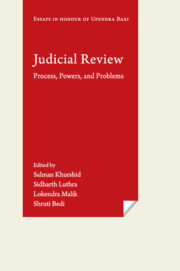Book contents
- Frontmatter
- Contents
- Foreword
- Editors' Note
- Introduction
- 1 The Inadequacy of Judicial Enforcement of Constitutional Rights Provisions to Rectify Economic Inequality, and the Inevitability of the Attempt
- 2 The Interplay of Law and Politics in India
- 3 Beating the Backlog: Reforms in Administration of Justice in India
- 4 Judicial Review: Perspectives and Reflections for the Twenty-First Century
- 5 When ‘Creeping Jurisdiction’ Goes Awry: The Social Action Litigation to Ban Surrogacy
- 6 Judicial Review and the Democratic Judge
- 7 Judicial Review: A Tool to Shape Constitutional Jurisprudence
- 8 The Baxian Bioscope on Indian Judicial Process
- 9 Judicial Activism, Courts, and Constitutional Revolutions: The Israeli Case
- 10 Democracy, Constitution, and Judicial Review: A Critique
- 11 A Minor Jurisprudence of Pathos: Upendra Baxi as Teacher and Writer
- 12 The Need for Reinventing the Supreme Court as a Constitutional Court
- 13 Appointment of ‘Distinguished Jurists’ as Judges in the Supreme Court of India: A Critical Analysis
- 14 Judicial Dissent and Judicial Review: A Functional Analysis
- 15 The Power of Judicial Review: Judicial Chutzpah or Judicial Desideratum
- 16 Judicial Review of Legislations by Tribunals in India: Law, Problems, and Perspectives
- 17 Criminalization of Membership of Terrorist Organizations in India and the United States of America: Human Rights Concerns
- 18 Article 142 of the Indian Constitution: On the Thin Line between Judicial Activism and Restraint
- 19 Sketching the Limits of Article 142 of the Constitution of India: A Constitutional Necessity
- 20 Constitutional Morality and Judges of the Supreme Court
- About the Contributors
- Index
13 - Appointment of ‘Distinguished Jurists’ as Judges in the Supreme Court of India: A Critical Analysis
Published online by Cambridge University Press: 23 January 2020
- Frontmatter
- Contents
- Foreword
- Editors' Note
- Introduction
- 1 The Inadequacy of Judicial Enforcement of Constitutional Rights Provisions to Rectify Economic Inequality, and the Inevitability of the Attempt
- 2 The Interplay of Law and Politics in India
- 3 Beating the Backlog: Reforms in Administration of Justice in India
- 4 Judicial Review: Perspectives and Reflections for the Twenty-First Century
- 5 When ‘Creeping Jurisdiction’ Goes Awry: The Social Action Litigation to Ban Surrogacy
- 6 Judicial Review and the Democratic Judge
- 7 Judicial Review: A Tool to Shape Constitutional Jurisprudence
- 8 The Baxian Bioscope on Indian Judicial Process
- 9 Judicial Activism, Courts, and Constitutional Revolutions: The Israeli Case
- 10 Democracy, Constitution, and Judicial Review: A Critique
- 11 A Minor Jurisprudence of Pathos: Upendra Baxi as Teacher and Writer
- 12 The Need for Reinventing the Supreme Court as a Constitutional Court
- 13 Appointment of ‘Distinguished Jurists’ as Judges in the Supreme Court of India: A Critical Analysis
- 14 Judicial Dissent and Judicial Review: A Functional Analysis
- 15 The Power of Judicial Review: Judicial Chutzpah or Judicial Desideratum
- 16 Judicial Review of Legislations by Tribunals in India: Law, Problems, and Perspectives
- 17 Criminalization of Membership of Terrorist Organizations in India and the United States of America: Human Rights Concerns
- 18 Article 142 of the Indian Constitution: On the Thin Line between Judicial Activism and Restraint
- 19 Sketching the Limits of Article 142 of the Constitution of India: A Constitutional Necessity
- 20 Constitutional Morality and Judges of the Supreme Court
- About the Contributors
- Index
Summary
Introduction
This chapter is contributed in honour of Professor Upendra Baxi, one of the most eminent Indian jurists, well known for his outstanding visible contribution to the cause of legal education and scholarship. Popularly known as Upen, Professor Baxi is considered as a giant of legal academia in the country. His contribution as a legal educator, academic statesman, a prolific author, a legal philosopher, and a thoughtful citizen is beyond description. In contemporary times, he has had a substantial influence on the legal scholarship, particularly in India. He is considered as a champion of human rights, dignity, feminist, and poverty jurisprudence. He is a thoughtful citizen who does not hesitate to express his views unequivocally on a variety of issues such as governance, judicial system, education, and so on. Over a period of six decades, he has contributed many books and articles that are widely acknowledged and admired in the academic world. His critical approach differentiates him from others substantially. He is a great legal philosopher whose jurisprudential thesis is appreciated across the academic disciplines. I am glad to contribute this chapter in honour of such a celebrated jurist and a great human being whose academic contribution is unmatchable. Let us celebrate the academic contribution of this eminent legal philosopher.
Law professors constitute a big section of academics in India who are engaged in the profession of conducting research and teaching law in different universities and colleges across the country, producing thousands of lawyers over the years. They are highly qualified in terms of education, in fact more qualified than their counterparts inside the courtrooms, judges and lawyers, but, unfortunately, their stake in the legal profession is less recognized and limited. They certainly deserve a better treatment. In fact, they are highly ignored by the rest of the legal fraternity as well as the government. In the legal profession, they are on the lowest level. They have very few opportunities to contribute to the judicial system of the country and people look them down. It is generally assumed that they are confined only to the lecture halls and cannot give any substantial input to the government or the judiciary which may be helpful in the practical working of the legal system. Even in the twenty-first century, when other sectors are growing fast, the law teachers are fighting for recognition.
- Type
- Chapter
- Information
- Judicial Review , pp. 236 - 251Publisher: Cambridge University PressPrint publication year: 2020



